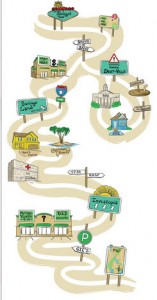 Many of us are still slogging through the aftermath of the worst recession this country has endured since the Great Depression of the 1930s.
Many of us are still slogging through the aftermath of the worst recession this country has endured since the Great Depression of the 1930s.
While the economy has recovered in several areas large numbers of Americans are still reeling. We feel out of control and living on the edge from a personal financial perspective. This article begins a series whose purpose is to help you regain control of finances, achieve financial health and even a sense of serenity (if not downright giddiness) about your financial standing.
But where to start? Well, with a map because as they say, if you don’t know where you’re going any road will take you there and the there, from a personal financial perspective, may not be a place you want to visit.
Financial Control, the First Step
So, our first step to financial recovery is to…
- Know where you stand; precisely.Many people only have a vague idea of their true financial standing so your first task is to develop an accurate map of your finances. There are sophisticated financial programs that will help you do this but an Excel spreadsheet or even a few sheets of notebook or ledger paper will work just as well.Write down everything related to your finances:
- Get your credit score. This might be painful but you need to know how your credit worthiness is viewed by bankers and other lenders. At the end of the day, this is one of the benchmarks that you’ll use to chart your progress toward financial health.
- Mortgage, 2nd Mortgages, Secured Lines of Credit. Record who you owe, what you owe, the interest rate, term remaining, monthly payment, and an approximate value of your home or other real estate owned. (Use a free service like Zillow.com or Trulia.com to get a quick estimate of your home price or simply look at similar homes for sale in your neighborhood to get a rough value.)
- Record your credit card obligations. Again, record the outstanding balances, interest rates, annual fees (if any), minimum monthly payments and any associated fees.
- Write down personal financial transactions. Have you lent anybody any money. Record the details. Is the debt current. Is it viable or should you bite the bullet and write it off or send it to collections (“Sorry Auntie, but you’re a deadbeat. My love to Uncle Ben!”). Likewise, record any money you owe to friends, family, employer or other 3rd party including the amount owed, repayment terms and whether you’re current or not on your obligation. If not current, record how much you’re in arrears.
- Note any savings. Where it is, how much it is, is it accessible or tied up in a CD or other financial instrument.
- Record your portfolio. List any stocks, bonds or other financial instruments, their current market value and any income from these (dividends, etc.).
- List any retirement accounts, pension funds, 401K plans, IRAs and any other retirement asset including your current balance and your level vested.
- Make an assessment of your ‘liquid’ assets. Do you own gold, other precious metals, an appraised stamp or coin collection, a 1954 Hank Aaron rookie card (highest current eBay listing? $10,995 – wow!). What could you easily sell if you had to without conducting a garage or fire sale?
- Review your insurance polices for home, mortgage, property, health, life, automobile, professional and any other coverage you carry. Note the amount of coverage, the terms, your deductible, your monthly or annual payment, cash value, if any and, if known, the ease of working with your insurer. Are they responsive. Do they pay promptly when claims are filed or do they drag their feet and nickel and dime you to death.Authors Note: Be Conservative in Assessing Value.
Whenever you’re assessing value without a formal appraisal err on the low side when assigning a value. Believe me you’d rather be pleasantly surprised than feel like you’ve been robbed if it becomes necessary or desirable to part with an asset.
Knowing Your True Financial Situation is Not for Sissies
This exercise in developing your personal financial road map is not trivial nor for the faint of heart but believe me that once you’re out of the dark and in the light about your financial situation you’ll feel a sense of relief. Fear of the unknown is a much bigger monster in the closet than fear of the known. So go to it, take your time, do it over a weekend or a couple of weeks but don’t stop until it’s done.
Next Steps. Putting Your Financial Road Map to Use
Our next article in the series will focus on low hanging fruit. Where can you score immediate financial gain, or relief. We’ll look at smart strategies for getting the most out of your current situation as we begin to use your personal financial road map to chart a course to solvency, security and financial serenity!



